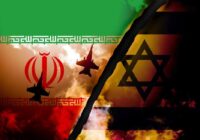Israel’s backtracking on Netanyahu’s promises is likely to be seen by FIFA as one more example of Israeli intransigence.
Israel and Palestine are playing political soccer, with Palestinian football as the ball. It is a match that Israel is unlikely to win, and this could prove to produce a bruising loss.
The stakes for Israel are far higher than for Palestine. Israel is effectively on probation as it seeks to defeat Palestinian efforts to persuade world soccer body FIFA to suspend Israeli membership as part of a broader Palestinian campaign to isolate the Jewish state in international organizations.
Israel narrowly evaded suspension in May as a result of an intensive lobby campaign that convinced the Palestinians to withdraw a resolution at a FIFA congress, in exchange for Israeli concessions. FIFA agreed to appoint a commission that would oversee Israel’s implementation of its promises to ease restrictions that inhibit the development of Palestinian soccer. The committee is required to regularly report back to FIFA’s executive committee.
In talks with FIFA President Sepp Blatter in May, Israeli Prime Minister Binyamin Netanyahu proposed giving Palestinian players special identity cards and placing sports liaison officials at crossings between Palestinian areas and those under Israeli control to ease movement. He further suggested a special escort service between Gaza and the West Bank to allow players to cross between the two Palestinian territories.
Israel appeared to be standing by its promises, when—for the first time in 15 years—it granted a West Bank team passage to Gaza to play a Palestine Cup final match. Hopes that this signaled a new beginning were, however, dashed when the Palestine Football Association (PFA) cancelled the return match in Hebron, which had been scheduled for August 9 after Israel agreed to grant passage to 33 of the 37 players planning to travel from Gaza to the West Bank. Israel demanded that the four remaining players present themselves to security authorities for questioning, after which the Israelis would decide whether they would be allowed to travel.
The incident sparked a war of words, with Israel and Palestine trading barbs in the wake of the match’s cancellation. Each side accused the other of playing politics.
“As always, the Israeli occupation wanted to spoil our happiness,” said Abdel-Salam Haniyeh, a spokesman for the Palestinian Higher Council of Sport. Israel’s coordinator of Government Activities in the Territories described the players’ refusal to present themselves as “another cheap provocation” by PFA President Jibril al-Rajoub, a former security official, prominent politician and potential presidential candidate.
Although there is little doubt that there is enough blame to go round, Israel’s insistence on the questioning of the players is likely to be seen as Netanyahu backtracking on his promises. A majority of FIFA members agree that Israel puts unreasonable obstacles in the path of Palestinian soccer, including restrictions on travel between the West Bank and Gaza as part of its sanctions against Hamas and on travel of Palestinian teams to third countries, as well as visits by foreign squads to the West Bank.
The Iran Deal
The cancellation of the match comes amid Israel’s isolation in seeking to preempt the conclusion of an agreement with Iran, which would end the nuclear crisis. Significant segments of Israeli and American Jewish society fear that Israel risks damaging its most important diplomatic and military relationship with the United States.
Israel’s international isolation increased when Gulf Arab states, who eye the Iran deal with varying degrees of suspicion, declared their cautious support for the accord. The move by the Gulf Cooperation Council (GCC) left Israel alone in opposing the agreement at a time when its policies toward the West Bank and Gaza are encountering mounting criticism. Moreover, a series of racist and discriminatory attacks against Palestinians and pro-gay Israeli activists have sparked soul-searching in Israel itself.
Israeli opposition leader Isaac Herzog warned that “we can’t turn away an outstretched hand of the United States president” who attempts “to add and strengthen the defense capabilities of Israel, as he has proven in an unprecedented way during his tenure.” Herzog went on to say that “an argument like this [is one that] you don’t have out on the balcony with the eyes of the neighbors and the world on it.”
For his part, Malcolm Hoenlein, the executive vice president of the Conference of Presidents of American Jewish Organizations, acknowledged “discomfort” among American Jews regarding Netanyahu’s aggressive campaign. “Israeli governments should not be telling American Jews what to do vis-à-vis their governments. And we shouldn’t be telling Israelis what they should do vis-à-vis their government,” Hoenlein added.
Concern about Netanyahu’s approach were reinforced when US President Barack Obama equated the main Israeli lobby in the US, the American Israel Public Affairs Committee (AIPAC), with lobbyists that 12 years ago dragged America into a disastrous war in Iraq—the consequences of which still dominate global national security concerns. Obama also described Israeli efforts to persuade the US Congress to vote against the nuclear agreement as unprecedented intervention in American internal affairs.
While Obama did not mention AIPAC by name, he left little doubt as to whom he was referring to. It was a rare frontal attack by a sitting US president on one of the most powerful lobbies in America that is waging a multi-million dollar, no holds barred campaign against the nuclear agreement, which is a cornerstone of US foreign policy in the Middle East.
Living up to Netanyahu’s promises to ease restrictions on Palestinian soccer would have earned Israel brownie points. The problem for Netanyahu and Israel’s nationalist right-wing is that sticking to the prime minister’s promises would have constituted evidence that Israel, whether governed by the right or the left, is capable (when pushed) of mustering the political will to take steps it had earlier rejected on security grounds.
As a result, Israel’s backtracking on Netanyahu’s promises is likely to be seen by many in FIFA as one more example of Israeli intransigence. No doubt, Palestine is playing football with Palestinian soccer. Scoring political points proved to be more important than letting a soccer match proceed. Nevertheless, in the overall climate of mounting criticism of Israel, Palestine is likely to win its high stakes political match against Israel if the Israelis fail to wise-up and pick their battles more carefully.
The views expressed in this article are the author’s own and do not necessarily reflect Fair Observer’s editorial policy.
Photo Credit: Gali Estrange / Shutterstock.com
 We bring you perspectives from around the world. Help us to inform and educate. Your donation is tax-deductible. Join over 400 people to become a donor or you could choose to be a sponsor.
We bring you perspectives from around the world. Help us to inform and educate. Your donation is tax-deductible. Join over 400 people to become a donor or you could choose to be a sponsor.
Support Fair Observer
We rely on your support for our independence, diversity and quality.
For more than 10 years, Fair Observer has been free, fair and independent. No billionaire owns us, no advertisers control us. We are a reader-supported nonprofit. Unlike many other publications, we keep our content free for readers regardless of where they live or whether they can afford to pay. We have no paywalls and no ads.
In the post-truth era of fake news, echo chambers and filter bubbles, we publish a plurality of perspectives from around the world. Anyone can publish with us, but everyone goes through a rigorous editorial process. So, you get fact-checked, well-reasoned content instead of noise.
We publish 2,500+ voices from 90+ countries. We also conduct education and training programs
on subjects ranging from digital media and journalism to writing and critical thinking. This
doesn’t come cheap. Servers, editors, trainers and web developers cost
money.
Please consider supporting us on a regular basis as a recurring donor or a
sustaining member.
Will you support FO’s journalism?
We rely on your support for our independence, diversity and quality.







Comment